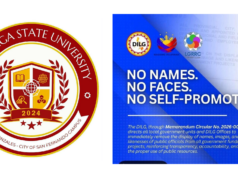Miami, FL – This is perhaps a subject where I am the least authority of, if at all, as I have not yet raised a kid. But it never ceases to amaze me how we Filipinos struggle and opt to speak English, instead of our mother tongue Tagalog, to their children. This p_posts is not in our vernacular either but let me go on.
In my years of travel, this obvious situation finally dawned on me and trust me, it seems peculiar to the Filipino community worldwide. A few examples:
Saudi Arabia: Working for the English newspaper Saudi Gazette, I was privileged to cover the Philippine Embassy Schools in Jeddah, Khobar and Riyadh. And you bet, all the kids there, Filipinos mostly if not all, spoke to each other in American English complete with California accent, particularly the L.A. signature oh mah God! They are well versed in Arabic too but surprisingly, not in Tagalog.
Europe: Covering France, I was also a tourist on the side and of course went to the top of the Eiffel Tower where a Filipino family of three was also enjoying the sights. You bet again, Tatay and Nanay, bunso in tow, spoke to him in impeccable English.
Las Vegas, NV: Here I thought I saw a glimmer of hope. Having lunch in a Filipino restaurant one day while assigned there to organize homecare workers for the union, there was a humble couple painfully struggling to talk to their son, about five years old I guess, in Tag-lish. Nothing wrong methinks and the boy dutifully responded perfectly in the favorite language of Balagtas: “You it beydstabols anak, it is gud por you, ayan o,” nanay said to which the kid responded: “Opo Nanay, gusto ko rin ng adobo at pancit.”
I can’t help but compliment the couple and interrupted them politely, in Tagalog and said it is nice to see a Filipino child in the US still speaking perfect Tagalog, with a genuine Filipino accent, and not the Teyg-ah-log we now most certainly hear from Fil-Am kids, if we hear them speaking at all (kownti lang!)
The nanay looked at me, seemingly embarrassed and explained: “Wag po kayong mag-alala, mawawala rin ang Tagalog nyan, kararating po lang kasi eh (Don’t you worry, he will forget Tagalog and he speaks that now because he just got here from the Philippines).” I was dumbfounded, these parents were actually hoping that their child, whom they had obviously just successfully petitioned, will totally forget Tagalog in due time. Unbelievable.
Fresno, CA – A Fil-Am union member/organizer bore an unmistakably Filipino last name as in Macabuhay, Matangkay, etc but when I asked if he spoke Tagalog he replied: “Oh no, I am third generation.” Like it is a sin to talk Tagalog after one is born and raised here. Okay. And to think the Hmong People there speak Hmong to their kids too.
I am neither a language police nor a moral crusader here but please parents, including a lot of my friends, tell me, parang awa nyo na, why are we the only minority or ethnic group in the whole wide world, not talking to our kids in our own language? The Latinos speak Spanish to their kids, the Haitians speak Creole to their kids, the Russians speak Russian to their kids, the Chinese, Koreans, the list can go on.
I do not want to think we are embarrassed of our language as my friends with kids tell me they do not want their children to get confused. That is why a lot of Filipino and Filipino-American kids come home learning Spanish and English more than Tagalog?
Lest I be accused of making a sweeping statement, let me give credit to my high school classmate and friend Stanley Orquia, now a successful registered nurse in Tampa, FL. Stanley and beautiful wife Nerrie talk to their son Tristan Kerr a.k.a Wewe, in Kapampangan, our language in Pampanga. And really, Wewe talks better Kapampangan than I do.
Generally though, a lot of us do not do what Stanley and Nerrie are successfully accomplishing and I want to justify sometimes this dilemma – saying things in Tagalog is a lot more kilometric, like saying the hour and time, than English and Spanish. But is this really how we want our future generations to move forward, totally oblivious how to say the simplest Tagalog words as sinigang? Well, just my two cents’ worth.
In my years of travel, this obvious situation finally dawned on me and trust me, it seems peculiar to the Filipino community worldwide. A few examples:
Saudi Arabia: Working for the English newspaper Saudi Gazette, I was privileged to cover the Philippine Embassy Schools in Jeddah, Khobar and Riyadh. And you bet, all the kids there, Filipinos mostly if not all, spoke to each other in American English complete with California accent, particularly the L.A. signature oh mah God! They are well versed in Arabic too but surprisingly, not in Tagalog.
Europe: Covering France, I was also a tourist on the side and of course went to the top of the Eiffel Tower where a Filipino family of three was also enjoying the sights. You bet again, Tatay and Nanay, bunso in tow, spoke to him in impeccable English.
Las Vegas, NV: Here I thought I saw a glimmer of hope. Having lunch in a Filipino restaurant one day while assigned there to organize homecare workers for the union, there was a humble couple painfully struggling to talk to their son, about five years old I guess, in Tag-lish. Nothing wrong methinks and the boy dutifully responded perfectly in the favorite language of Balagtas: “You it beydstabols anak, it is gud por you, ayan o,” nanay said to which the kid responded: “Opo Nanay, gusto ko rin ng adobo at pancit.”
I can’t help but compliment the couple and interrupted them politely, in Tagalog and said it is nice to see a Filipino child in the US still speaking perfect Tagalog, with a genuine Filipino accent, and not the Teyg-ah-log we now most certainly hear from Fil-Am kids, if we hear them speaking at all (kownti lang!)
The nanay looked at me, seemingly embarrassed and explained: “Wag po kayong mag-alala, mawawala rin ang Tagalog nyan, kararating po lang kasi eh (Don’t you worry, he will forget Tagalog and he speaks that now because he just got here from the Philippines).” I was dumbfounded, these parents were actually hoping that their child, whom they had obviously just successfully petitioned, will totally forget Tagalog in due time. Unbelievable.
Fresno, CA – A Fil-Am union member/organizer bore an unmistakably Filipino last name as in Macabuhay, Matangkay, etc but when I asked if he spoke Tagalog he replied: “Oh no, I am third generation.” Like it is a sin to talk Tagalog after one is born and raised here. Okay. And to think the Hmong People there speak Hmong to their kids too.
I am neither a language police nor a moral crusader here but please parents, including a lot of my friends, tell me, parang awa nyo na, why are we the only minority or ethnic group in the whole wide world, not talking to our kids in our own language? The Latinos speak Spanish to their kids, the Haitians speak Creole to their kids, the Russians speak Russian to their kids, the Chinese, Koreans, the list can go on.
I do not want to think we are embarrassed of our language as my friends with kids tell me they do not want their children to get confused. That is why a lot of Filipino and Filipino-American kids come home learning Spanish and English more than Tagalog?
Lest I be accused of making a sweeping statement, let me give credit to my high school classmate and friend Stanley Orquia, now a successful registered nurse in Tampa, FL. Stanley and beautiful wife Nerrie talk to their son Tristan Kerr a.k.a Wewe, in Kapampangan, our language in Pampanga. And really, Wewe talks better Kapampangan than I do.
Generally though, a lot of us do not do what Stanley and Nerrie are successfully accomplishing and I want to justify sometimes this dilemma – saying things in Tagalog is a lot more kilometric, like saying the hour and time, than English and Spanish. But is this really how we want our future generations to move forward, totally oblivious how to say the simplest Tagalog words as sinigang? Well, just my two cents’ worth.




